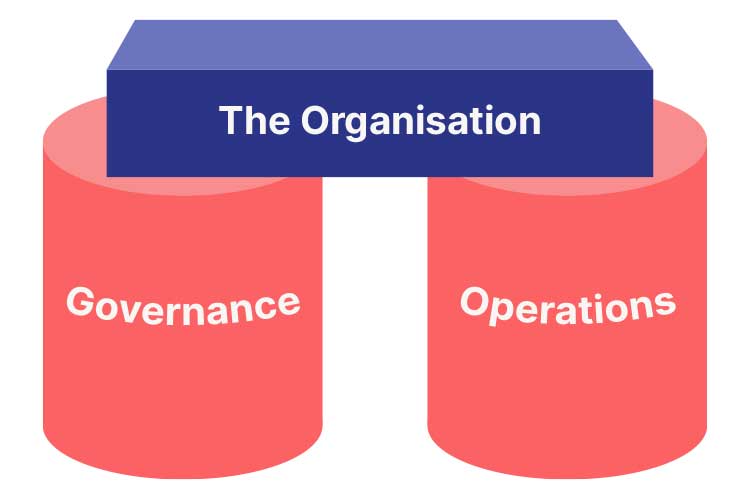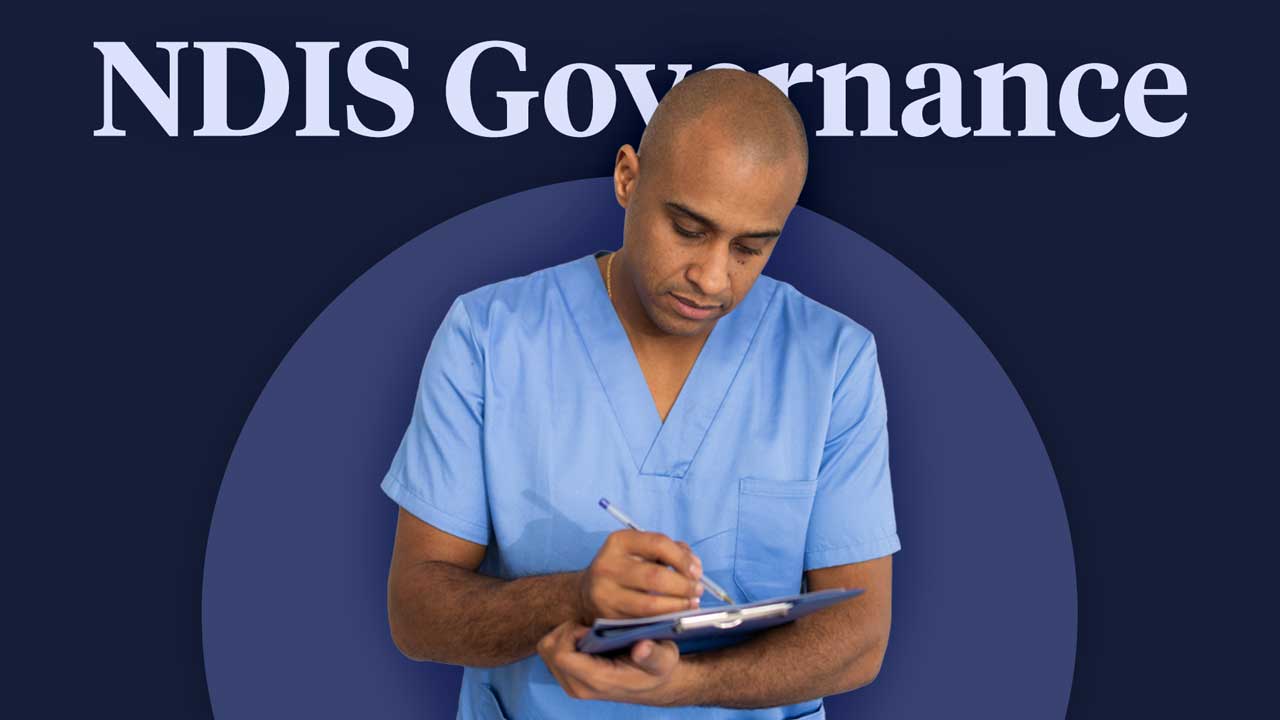Providers of National Disability Insurance Scheme (NDIS) services are expected to meet specific criteria relating to governance and operational management.
What are Governance and Operational Management?
Firstly, let’s define these key terms:
Governance
Governance can be described as the system underpinning the way in which an organisation operates at the highest level, and the mechanisms that hold the organisation and its people accountable. Key concepts of governance include ethics, risk management, compliance and administration (Governance Institute of Australia 2024; Cambridge Dictionary 2024).
According to the Ethnic Communities' Council of Victoria (ECCV)’s Good Governance Guide (2018), the characteristics of good governance include:
- Accountability
- Transparency
- Following the rule of law (i.e. adhering to relevant legislation and legal, compliance and quality and safeguarding requirements)
- Responsiveness to the community being served
- Equitability and inclusiveness
- Effectiveness and efficiency
- Enabling anyone who is affected by or interested in a decision to participate in the decision-making process.
Operational Management
Operational management is the use of business practices to foster the highest level of efficiency possible within an organisation (Hayes et al. 2024; CFI 2019).
In healthcare, operational management may include ensuring systems work smoothly, rostering, training, allocating funds and other practices.
Those in charge of operational management perform tasks such as:
- Planning
- Organising
- Overseeing the organisation’s processes
- Ensuring that organisational leaders actively practice critical thinking abilities when allocating resources such as staff, equipment and technology while maintaining a person-centred approach, safe practice and positive outcomes
- Acquiring, developing and delivering goods to clients.
(Hayes et al. 2024; CFI 2019)

Benefits of Good Governance and Operational Management
Good governance may help to:
- Steer the organisation towards its visionv
- Ensure that day-to-day management aligns with the organisation’s goals and purpose
- Improve decision-making
- Ensure the organisation meets its objectives and fulfils its obligations.
(ECCV 2018)
Good operational management may help to:
- Improve the quality of care
- Improve client satisfaction
- Maintain person-centred care
- Increase revenue
- Reduce waste
- Facilitate collaboration between staff at all levels of the organisation.
(PlanetTogether 2021)
Consequences of Poor Governance and Operational Management
Poor governance may lead to:
- Losing sight of the organisation’s purpose and responsibilities to the community
- Corruption
- Negligence
- Fraud
- Lack of accountability
- Commercial failure
- Financial or legal issues.
(Pavlović 2018; ECCV 2018)
Poor operational management may lead to:
- Negative health outcomes and client care experiences
- Reduced staff morale
- Reduced productivity
- Disengagement from continuous professional development
- Loss of staff
- Reliance on proven methods instead of searching for new solutions
- Poor budgeting
- Difficulty hiring staff.
(Amoroso 2023)
Governance and Operational Management in the NDIS Practice Standards

Governance and operational management are requirements of the NDIS Practice Standards under Core Module 2: Provider Governance and Operational Management.
This Practice Standard aims to ensure that:
- NDIS participants have their support overseen by robust governance and operational management systems
- Governance and operational management systems are proportional to the service provider’s size and scale, as well as the scope and complexity of the supports delivered.
(NDIS 2021)
NDIS providers must meet the following quality indicators:
- The provider’s governing body enables people living with disability to contribute to organisational governance, as well as provide input into the development of policies and procedures that relate to the delivery of services and the protection of NDIS participants’ rights
- The provider’s governing body establishes a defined structure in order to meet their financial, legislative, regulatory and contractual responsibilities, as well as monitor and address quality and safeguarding matters related to the delivery of supports
- The skills and knowledge required for effective governance are identified, and any skills gaps in the governing body are addressed via appropriate training
- The provider’s governing body ensures that strategic and business planning considers the following:
- Legal obligations
- Organisational risks
- Other requirements related to operating under the NDIS (e.g. Agency requirements and guidance)
- NDIS participants’ and workers’ needs
- The wider organisational environment
- The provider’s governing body monitors the performance of management (including responses to individual issues) in order to encourage continuous improvement in management practices
- The provider is managed by appropriately qualified and experienced individuals. They have clearly defined responsibility, authority and accountability for the provision of services
- If a position holder is absent, there is a documented system in place to delegate responsibility and authority to another suitable individual
- Conflicts of interest (both perceived and actual) are managed and documented proactively, including through the development and maintenance of organisational policies.
(NDIS 2021)
Topics
References
- Amoroso, B 2023, ‘Financial Implications of Poor Operations Management’, Biz2Credit Blog, 3 October, viewed 15 July 2024, https://www.biz2credit.com/blog/2020/02/03/financial-implications-of-poor-operations-management/
- Cambridge Dictionary 2024, Governance, Cambridge Dictionary, viewed 15 July 2024, https://dictionary.cambridge.org/dictionary/english/governance
- Corporate Finance Institute 2019, What is Operations Management?, CFI, viewed 15 July 2024, https://corporatefinanceinstitute.com/resources/knowledge/strategy/operations-management/
- Ethnic Communities' Council of Victoria 2018, ECCV Good Governance for an NDIS Environment Guide, ECCV, viewed 15 July 2024, https://eccv.org.au/wp-content/uploads/2019/03/V4-ECCV-Good-Governance-Guide.pdf
- Governance Institute of Australia 2024, What is Governance?, Governance Institute of Australia, viewed 15 July 2024, https://www.governanceinstitute.com.au/resources/what-is-governance/
- Hayes, A, Yashina, N & Jackson A 2024, Operations Management: Understanding and Using it, Investopedia, viewed 15 July 2024, https://www.investopedia.com/terms/o/operations-management.asp
- NDIS Quality and Safeguards Commission 2020, NDIS Practice Standards: NDIS Practice Standards and Quality Indicators, Australian Government, viewed 6 July 2021, https://www.ndiscommission.gov.au/sites/default/files/documents/2019-12/ndis-practice-standards-and-quality-indicators.pdf
- Pavlović, A 2018, ‘3 Reasons Businesses Demonstrate Poor Corporate Governance’, Ideagen Blog, 5 June, viewed 15 July 2024, https://www.ideagen.com/thought-leadership/blog/3-reasons-businesses-demonstrate-poor-corporate-governance
- PlanetTogether 2021, ‘Importance of Effective Operations Management (OM)’, PlanetTogether Blog, 4 January, viewed 15 July 2024, https://www.planettogether.com/blog/importance-of-effective-operations-management

